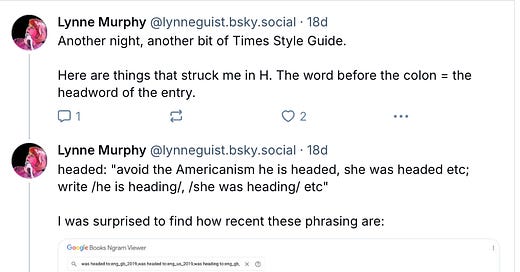This newsletter contains gratuitous Saxons
This time: how to talk about medieval folk, a Style Guide obsession, and oodles of links.
Hello and thanks for reading Separated by a Common Newsletter!
Angles on Anglo-Saxon
This month’s blog post is about the term Anglo-Saxon and how it’s used in different ways by different people—particularly Americans, Britons, and the French (and perhaps other Europeans). The post is particularly indebted to Dave Wilton, who has published an academic article on the use of the term Anglo-Saxon in general English (US and UK). He was concerned that connotations of the term outside academia might colo(u)r perceptions of academic work concerning Britain in the Middle Ages.
Anglo-Saxon is a name for the English people before the Norman invasion, and in my post I note that I’ve been using Anglo-Saxon as I write about Old English. I’ve preferred writing about the Anglo-Saxons speaking Anglo-Saxon because ‘the English speaking Old English’ doesn’t drive home how different that language was from what we speak today.
But thinking more about it Wilton’s points, I might change my mind about that. As discussed at the post and in his article, the term is used in much more often in racial ways (often associated with white supremacy) in the US than in the UK. Wilton argues:
The fact that British, or other, scholars do not intend to use “Anglo-Saxon” to reinforce a white supremacist ideology is irrelevant; the term’s use has that effect regardless of intention. While the problem may manifest itself most strongly elsewhere, Britain is not immune to its effects. (Wilton 2020: 454)Maybe when I re-edit that chapter draft, I’ll switch to talking about ‘the Ænglisc speaking Ænglisc’ instead. That might do enough to make my point about how different Old English and Modern English are. Have a look at the post, and let me know what you think:
What else I’ve been up to
While at the public library last month, I saw a copy of The Times/The Sunday Times Style Guide on a display table. I took that as a sign, and brought it home, only to find myself obsessively tweeting on Bluesky about it. Every evening, another alphabetical section. It was ridiculous, and yet I did it. If you like to waste your time too, then there are dozens of Bluesky posts to look at. (Instructions: follow that link and you’ll get all my posts that say ‘Times Style Guide’ in them. If you click any that is beginning a day’s tweeting, e.g. ‘Here is what struck me in H’, then you’ll get to that day’s thread of posts.) It’ll start like this:
And then it’ll go on and on and on.
The more exciting part of my month involved a minibreak to Dublin before Easter. Here’s a snapshot of a linguistically interesting bus ad(vert):
Good reads
RIP Kanzi, who has died unexpectedly at age 44.
“How Substack steals your audience” If you’re not getting the newsletters you think you should be getting, this might be why (Journalist Pay Themselves)
Algorithms are killing coincidences: what does that mean for language? (Etymology Nerd substack)
‘The Importance of being Ernest’: The Economist analy{s/z}ed 400,000,000 first names in 143 years of British and American history and what they connote. The interactive post lets you look at the popularity and connotations of names over time. (The Economist. It is paywalled, but you can register to read one article for free; via Fritinancy)
The Star-Spangled Banner in Spanish (Dennis Baron, The Web of Words)
“foreign accents can have a big impact on the way we interpret meaning” (The Conversation)
Ever more on accentism in Britain: “Five-year-olds ‘link accent with intelligence’” (BBC) & Accent info in the BBC Archives revealed and a reaction to that “No bab, Brummies don’t sound stupid” (Guardian)
The most commonly used Britishisms in spoken American English (Guardian)
Only Olds say ‘zed’ (Language Hat)
Saturday Night Live is coming to the UK—but many don’t think it’ll work. Here’s the BBC Culture Editor on the challenges it will face and some advice from Lorcan Mullan on the UK comedy website Chortle.
Onomatopoeia Odyssey: an interactive journey into sound-words around the world (via Clive Thompson)
The hardest working font in Manhattan (Aresluna, also via Clive Thompson)
How corpus linguistics is changing how (US) courts interpret law (Humanities magazine)
If you’ve been following my blog, you’ll have seen lots of results from linguistic corpora (text collections) put together by Mark Davies (Professor Emeritus at Brigham Young University). He’s written a number of ‘white papers’ on corpus linguistics in the age of Large Language Models.
And US/UK expressions quick-fire round: awful/awesome (Word Origins); eye-watering (Not One-Off Britishisms); persnickety/pernickety and skedaddle (Sesquiotica); groceries and pickle (Fritinancy).
Listen/watch here
Ross Perlin’s Language City has been BBC Radio 4’s Book of the Week. (Not sure that link will work outside UK: if not, see here)
Accessible sound technology: how Apple products’ features have been shaped by/for accessibility (Twenty Thousand Hertz podcast)
The New Books Network podcast’s Language feed has been full of good stuff lately. I can’t pick which to share, so have a browse!
Here’s a video explainer on Construction Grammar, aka why many well-known ideas about grammar are out of date:
From the archives
Since I linked to Fritinancy’s pickle post, here’s mine on British pickle v American pickles, plus the sneaky rutabaga.
Joke of the month
If you’re on the wordy internet at all, you’ll probably have seen this. But it’s worth watching again!
Coming up…
I haven’t decided on the next blog post—but it may involve a recent journal article. As ever, you’re welcome to make suggestions!





![On the side of a green bus: ""Ma, Mam, or Mum? One thing Dubliners can agree on— [company name], their #1 choice for broadband" On the side of a green bus: ""Ma, Mam, or Mum? One thing Dubliners can agree on— [company name], their #1 choice for broadband"](https://substackcdn.com/image/fetch/$s_!0rpH!,w_1456,c_limit,f_auto,q_auto:good,fl_progressive:steep/https%3A%2F%2Fsubstack-post-media.s3.amazonaws.com%2Fpublic%2Fimages%2F9ed07e17-d5e7-472f-b460-986b1898d47b_3234x1957.heic)